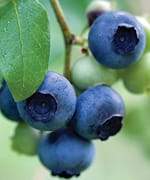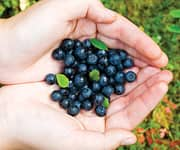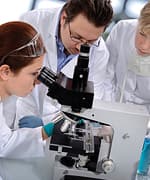Life Extension Magazine®
Until recently, the majority of scientific research on blueberries has focused on the cognitive benefits of this fruit. Multiple studies have shown that blueberries slow age-related damage to brain cells and protect memory-associated brain regions from oxidant and inflammatory damage.1,2 The result is improvements in overall cognitive function.3,4 Researchers have uncovered new data showing that blueberries delay aging and promote longevity. In laboratory experiments, blueberries and their extracts have extended the life span in two different models of aging.5,6 Additionally, blueberries have been shown to fight DNA damage, metabolic syndrome, heart disease, and even cancer. Rich in anthocyanins and pterostilbenes, blueberries are becoming a critical component of a science-based longevity program. Blueberries Increase Life Span Across SpeciesIn studying longevity benefits of various compounds, scientists often use fruit flies as a laboratory model of aging. What researchers discovered is that fruit flies live 10% longer when fed a regular diet containing blueberry extract.5 Not only do the fruit flies live longer but they also show improved levels of physical activity. These enhancements arise both from increased tolerance of oxidant stress and from beneficial changes in the way certain important genes are expressed. Still more dramatic life span extension has been shown in another aging model called C. elegans. After supplementation with blueberry extract, these organisms lived an average of 28% longer, and the maximum life span increased by 14%.6 The supplemented animals showed a 20% reduction in an age-related protein that impairs function, and vastly improved tolerance of stress in their environment.6 Mammals experience increased longevity and slowed aging processes when fed blueberry extracts, as shown by a study of mice on calorie restriction. When calorie-restricted mice had blueberry extracts added to their food ration, they not only outlived the normally-fed mice, but also the calorie-restricted mice who were not given the supplement as well.7 In addition to extending the life span of whole organisms, blueberries and their extracts slow aging in individual tissues, providing wide physiological benefits. (See table 1). Along with increasing all around longevity, blueberries can specifically decrease the risk of various degenerative diseases that reduce the human life spans.
Lose Weight and Lower Obesity-Related Risk FactorsAmericans have enjoyed a steady rise in life expectancy for more than two centuries, but that is likely to change, due to the spiraling increase in obesity rates.8 If we don’t change our ways, average life span may decrease by 5 years or more, say members of an expert panel convened by the National Institute on Aging.9 Blueberry extracts have many positive effects that may help you lose weight and keep it off. Studies show that animals fed blueberry extracts while on a high-fat diet had lower overall weight gain, and smaller accumulations of body fat, than control animals.10-12 Importantly, the loss of body fat is especially prominent in the abdominal areas and the liver; fat in those areas poses the greatest risk of cardiovascular disease and other life-shortening complications of obesity.13,14 Some of blueberries’ anti-obesity benefits come from their ability to block enzymes in the intestines that promote carbohydrate absorption.15 Once absorbed into the body, blueberry flavonoids slow the rate at which fat cells develop and multiply, and decrease the amount of fat stored by each cell.16 Blueberry extracts promote sugar uptake into muscle cells, where it can be used as energy, rather than being stored as fat.13 Finally, blueberry extracts suppress the inflammation and other unfavorable biochemical effects produced by fat tissue.17-19
Avoid the Metabolic Syndrome and DiabetesObesity is the central component of metabolic syndrome, which includes insulin resistance (pre-diabetes), high blood pressure, and elevated blood lipid and cholesterol levels. Metabolic syndrome kills early: people younger than age 65 who have it are 35% more likely to die from all causes, and 78% more likely to die from cardiovascular causes, than those who have avoided the syndrome.20 Blueberry extracts offer hope at many levels, combating the components of metabolic syndrome.21-36 Here’s how: Blueberry extracts fight elevated blood sugar levels and reduce insulin resistance. In published studies, blueberries block carbohydrate metabolism in the intestine by up to 90% compared with the prescription drug acarbose.15,22 That can help prevent dangerous after-meal sugar spikes associated with metabolic syndrome’s increased heart attack risk.22,23 Additionally, blueberries have been shown to lower baseline blood sugar levels in those diagnosed with type 2 diabetes by 37%.17,24,25 Large-scale human studies show that people with the highest blueberry intake are 23% less likely to develop type 2 diabetes, one of the outcomes of metabolic syndrome.26 Other studies show that blueberry extracts reduce the body’s resistance to insulin, especially in those that are obese, further reducing the risk for metabolic syndrome.13,18,19,25,27 Blueberry extracts lower blood pressure. People with the highest regular intake of blueberries have up to an 8% reduction in their risk for developing hypertension compared with those having the lowest intake.28 Studies show that blueberry extracts lower both systolic (top number) blood pressure and diastolic (bottom number) blood pressure in people with metabolic syndrome.27 Naturally hypertensive rats, fed blueberry extract for 8 weeks, showed a 30% lower systolic blood pressure level at 6 weeks.29 That can prevent kidney damage, a common consequence of hypertension.30 Blueberries’ blood pressure-lowering effects are the result of multiple mechanisms of action. Blueberries help blood vessels to relax, reducing the resistance to blood flow that produces high pressure (think of your finger on the end of a garden hose).31-33 And blueberry extracts inhibit a protein called angiotensin converting enzyme (ACE) that your body uses to keep blood pressure elevated; prescription drugs such as enalapril and lisinopril work in the same way, but have side effects.34 Blueberry extracts reduce blood levels of total and low-density lipoprotein (LDL) cholesterol; research shows this reduction can be as much as 12% and 15%, respectively.35,36 Triglyceride levels, (a potentially dangerous form of fat in the body), are lowered in the blood of blueberry-supplemented animals.13 Supplemented animals on a high-fat diet showed reduced triglyceride accumulation in the liver, one of the hallmarks of the metabolic syndrome.14 In one particularly compelling study, animals fed a very high-fat diet (60% of calories from fat) had marked elevations in serum cholesterol and triglyceride levels, but those levels were decreased to normal when blueberry extracts were added to the diet.11 Blueberry extracts reduce cholesterol production in the liver, and enhance excretion of cholesterol in the feces.36 Blueberries enhance exercise effects. Regular moderate exercise is one of the most important ways for you to combat metabolic syndrome. Most people, however, fall far short of getting sufficient exercise. Blueberries reduce the oxidant stress of exercise, which in turn can limit the duration and intensity of your workouts.37 Blueberry extracts prevent exercise-induced muscle damage that can leave you sore and aching and disinterested in future workouts.38 And supplementing with blueberry extracts adds to the immune-system boost that regular workouts can provide, helping to keep you vigorous both inside and out.39
Reduce Your Risk of Cardiovascular DiseaseHeart disease is the number one killer of Americans, affecting more than 27 million and causing nearly 600,000 deaths annually.40 Blueberries can combat heart disease by reducing your likelihood of developing major risk factors such as obesity, diabetes, lipid disorders, and the metabolic syndrome. They directly address some of the major biological changes in your body that lead to atherosclerosis, or “hardening of the arteries.”41 Blueberry extracts help your blood vessels regulate themselves by tightening up or relaxing in response to blood flow.32,42,43 Loss of this control is an early feature of atherosclerosis; left unchecked, it produces undesirable thickening (“hardening”) of arterial walls and a reduction in blood flow to vital tissues that ultimately produces a heart attack or stroke. Blueberry extracts fight the oxidation of fat that triggers inflammation, eventually leading to cholesterol-filled inflammatory plaques and thickening of the muscular layer of your arteries.21,44-46 When those plaques break loose, they can abruptly block an artery, triggering an infarction (tissue death from loss of blood flow). Blueberry-treated animals subjected to experimentally-induced heart attacks are partially protected from heart muscle injury;47 when such injury does occur they show significantly smaller areas of heart muscle damage than control animals.48 Survivors of heart attacks often face seemingly permanent loss of function and exercise tolerance, the result of a weakened heart muscle commonly known as heart failure. That can lead to premature death. Blueberry extracts can strengthen heart muscle contractions and boost the heart’s ability to pump blood effectively, even after a heart-failure-inducing heart attack.48 One animal study demonstrated a 22% reduction in death over the 12 months following a heart attack.48 Protect Yourself Against Cancer
Nearly 20 million Americans (almost 9% of us) have been diagnosed with some form of cancer.49 Cancer kills more than 567,000 US citizens annually, making it overall the second most common cause of death.49 Blueberries, with their rich supplies of flavonoids and other biologically active molecules, are uniquely equipped to block many of the complex processes that lead to cancer—and they do so through multiple mechanisms. Blueberry extracts block DNA damage. Damage to DNA, the universal cellular blueprint for reproduction, underlies every form of cancer. Blueberry extracts stop excessive proliferation. Uncontrolled cell reproduction results in formation of dangerous tumors, as cells ignore the normal signals to stop growing. By restoring normal cellular signaling, blueberry extracts stop such out-of-control proliferation.51-53 Blueberry extracts prevent development of pre-cancerous lesions. Many cancers, such as those of the colon and cervix, begin as so-called “pre-cancerous” lesions, or areas of abnormal, but not yet malignant, cell growth. Blueberry compounds sharply reduce the number of such abnormal tissues, by as much as 94% in the case of colon cancer.54,55 Blueberry extracts stop tumors’ blood supply. Rapidly-growing cancers recruit new blood vessels to meet their ravenous appetites for nutrients and oxygen. Blueberry compounds shut down that new vessel growth, or angiogenesis, and enhance survival rates.56,57 Blueberry extracts slow tumor spread by invasion and metastasis. Solid cancers produce “protein-melting” enzymes that help them invade adjacent tissues and that enable them to metastasize, or spread to distant parts of the body. Blueberry flavonoids block those enzymes, helping to control cancer’s aggressive spread.58,59 Blueberry extracts trigger cancer cells’ suicide. Normal cells are programmed to die if they replicate too fast, through a phenomenon called “apoptosis.” Cancerous cells, by contrast, ignore that programming, constantly doubling their population unchecked. Blueberry components restore normal programming and induce apoptosis in cells from a variety of cancers, putting the brakes on their rapid growth.51,60-62 To date, these multiple pathways of cancer prevention have been successfully applied to reduce tumor occurrence, growth, and progression in experimental models of breast, colon, prostate, lung, and oral cancers.53,58-60,62-64 Think More Clearly and Remember More VividlyLoss of memory and cognitive skills with age is frightening and tragic. Alzheimer’s disease is the sixth leading killer in America, causing more than 19,000 deaths annually and keeping nearly 232,000 people in nursing homes.65 Many of the remarkable healing powers of blueberries were first discovered in the area of neurocognitive diseases, and the evidence for their benefits continues to grow. Blueberry components enter and remain in the brain. Not all substances that you consume make their way into your brain, thanks to the powerful “blood-brain-barrier.” While this barrier protects your brain from dangerous and toxic substances, it can also limit access to potentially beneficial substances. Nutrient molecules extracted from blueberries have been detected in measurable quantities in brain tissue, especially in areas that serve memory functions.1 Blueberry extracts enhance memory and improve cognition. Older animals lose the ability to find their way around a maze, just as humans can forget their way home. Blueberry-supplemented older animals perform better on spatial and short-term memory tests, and have improved cognitive performance, compared to unsupplemented animals.1,66,67 The supplements reverse impairments in learning.68,69 Humans with mild cognitive impairment, often seen in advancing age, show increased performance on tasks of verbal memory following supplementation with blueberry extracts.70 Blueberry flavonoids reduce the impact of the “Alzheimer’s Disease Protein.” People with Alzheimer’s and other neurodegenerative diseases have collections of abnormal brain proteins that cause memory loss and cognitive decline. Blueberry extracts interfere with both production of those proteins, and with their destructive impact on the brain.71-74 Blueberry extracts protect brain tissue during stroke. Animals subjected to experimental strokes have smaller areas of infarction (brain cell death) if they are first supplemented with blueberries.75 They return sooner to normal activity levels than do control animals.75
SummaryBlueberries have appropriately been labeled as “superfruits,” possessing the ability to block and even reverse many of the consequences of aging. Long thought to mainly deliver their benefits through their antioxidant effects, blueberries are now recognized as having impacts on many different aging processes. In fact, recent studies prove that blueberry extracts can extend life span by significant amounts. It’s the specific flavonoid components of blueberries, rather than the whole fruits, that provide so many health benefits. Those compounds are now seen to prevent obesity, ameliorate the high blood pressure, lipid disturbances, and sugar intolerance of the metabolic syndrome, reduce cardiovascular risk, prevent cancer, and of course protect brain function both after stroke and from neurodegenerative diseases. If you have any questions on the scientific content of this article, please call a Life Extension® Health Advisor at 1-866-864-3027. Editor's NoteScience continues to evolve, and new research is published daily. As such, we have a more recent article on this topic: Blueberries Reduce Heart Disease Risk Factors | ||||||||||||||||||||||||||||
| References | ||||||||||||||||||||||||||||
| 1. Andres-Lacueva C, Shukitt-Hale B, Galli RL, Jauregui O, Lamuela-Raventos RM, Joseph JA. Anthocyanins in aged blueberry-fed rats are found centrally and may enhance memory. Nutr Neurosci. 2005 Apr;8(2):111-20. 2. Lau FC, Shukitt-Hale B, Joseph JA. The beneficial effects of fruit polyphenols on brain aging. Neurobiol Aging. 2005 Dec;26 Suppl 1:128-32. 3. Available at: http://www.scientificamerican.com/article.cfm?id=your-brain-on-blueberries. Accessed April 5, 2012. 4. Joseph JA, Shukitt-Hale B, Denisova NA, et al. Reversals of age-related declines in neuronal signal transduction, cognitive, and motor behavioral deficits with blueberry, spinach, or strawberry dietary supplementation. J Neurosci. 1999 Sep 15;19(18):8114-21. 5. Peng C, Zuo Y, Kwan KM, et al. Blueberry extract prolongs life span of Drosophila melanogaster. Exp Gerontol. 2012 Feb;47(2):170-8. 6. Wilson MA, Shukitt-Hale B, Kalt W, Ingram DK, Joseph JA, Wolkow CA. Blueberry polyphenols increase life span and thermotolerance in Caenorhabditis elegans. Aging Cell. 2006 Feb;5(1):59-68. 7. Aires DJ, Rockwell G, Wang T, et al. Potentiation of dietary restriction-induced life span extension by polyphenols. Biochim Biophys Acta. 2012 Apr;1822(4):522-6. 8. Olshansky SJ, Passaro DJ, Hershow RC, et al. A potential decline in life expectancy in the United States in the 21st century. N Engl J Med. 2005 Mar 17;352(11):1138-45. 9. Available at: http://www.nih.gov/news/pr/mar2005/nia-16.htm. Accessed April 5, 2012. 10. Prior RL, Wu X, Gu L, Hager TJ, Hager A, Howard LR. Whole berries versus berry anthocyanins: interactions with dietary fat levels in the C57BL/6J mouse model of obesity. J Agric Food Chem. 2008 Feb 13;56(3):647-53. 11. Prior RL, Wu X, Gu L, et al. Purified berry anthocyanins but not whole berries normalize lipid parameters in mice fed an obesogenic high fat diet. Mol Nutr Food Res. 2009 Nov;53(11):1406-18. 12. Prior RL, S EW, T RR, Khanal RC, Wu X, Howard LR. Purified blueberry anthocyanins and blueberry juice alter development of obesity in mice fed an obesogenic high-fat diet. J Agric Food Chem. 2010 Apr 14;58(7):3970-6. 13. Seymour EM, Tanone, II, Urcuyo-Llanes DE, et al. Blueberry intake alters skeletal muscle and adipose tissue peroxisome proliferator-activated receptor activity and reduces insulin resistance in obese rats. J Med Food. 2011 Dec;14(12):1511-8. 14. Liu Y, Wang D, Zhang D, et al. Inhibitory effect of blueberry polyphenolic compounds on oleic acid-induced hepatic steatosis in vitro. J Agric Food Chem. 2011 Nov 23;59(22):12254-63. 15. Johnson MH, Lucius A, Meyer T, de Mejia EG. Cultivar evaluation and effect of fermentation on antioxidant capacity and in vitro inhibition of alpha-amylase and alpha-glucosidase by highbush blueberry (Vaccinium corombosum). J Agric Food Chem. 2011 Aug 24;59(16):8923-30. 16. Moghe SS, Juma S, Imrhan V, Vijayagopal P. Effect of blueberry polyphenols on 3T3-F442A preadipocyte differentiation. J Med Food. 2012 Mar 8. 17. Vuong T, Benhaddou-Andaloussi A, Brault A, et al. Antiobesity and antidiabetic effects of biotransformed blueberry juice in KKA(y) mice. Int J Obes (Lond). 2009 Oct;33(10):1166-73. 18. Stull AJ, Cash KC, Johnson WD, Champagne CM, Cefalu WT. Bioactives in blueberries improve insulin sensitivity in obese, insulin-resistant men and women. J Nutr. 2010 Oct;140(10):1764-8. 19. DeFuria J, Bennett G, Strissel KJ, et al. Dietary blueberry attenuates whole-body insulin resistance in high fat-fed mice by reducing adipocyte death and its inflammatory sequelae. J Nutr. 2009 Aug;139(8):1510-6. 20. Basu A, Du M, Leyva MJ, et al. Blueberries decrease cardiovascular risk factors in obese men and women with metabolic syndrome. J Nutr. 2010 Sep;140(9):1582-7. 21. Stensvold D, Nauman J, Nilsen TI, Wisloff U, Slordahl SA, Vatten L. Even low level of physical activity is associated with reduced mortality among people with metabolic syndrome, a population based study (the HUNT 2 study, Norway). BMC Med. 2011;9:109. 22. Melzig MF, Funke I. Inhibitors of alpha-amylase from plants--a possibility to treat diabetes mellitus type II by phytotherapy? Wien Med Wochenschr. 2007;157(13-14):320-4. 23. Granfeldt YE, Bjorck IM. A bilberry drink with fermented oatmeal decreases postprandial insulin demand in young healthy adults. Nutr J. 2011;10:57. 24. Abidov M, Ramazanov A, Jimenez Del Rio M, Chkhikvishvili I. Effect of Blueberin on fasting glucose, C-reactive protein and plasma aminotransferases, in female volunteerswith diabetes type 2: double-blind, placebo controlled clinical study. Georgian Med News. 2006 Dec;(141):66-72. 25. Takikawa M, Inoue S, Horio F, Tsuda T. Dietary anthocyanin-rich bilberry extract ameliorates hyperglycemia and insulin sensitivity via activation of AMP-activated protein kinase in diabetic mice. J Nutr. 2010 Mar;140(3):527-33. 26. Wedick NM, Pan A, Cassidy A, et al. Dietary flavonoid intakes and risk of type 2 diabetes in US men and women. Am J Clin Nutr. 2012 Apr;95(4):925-33. 27. Basu A, Lyons TJ. Strawberries, blueberries, and cranberries in the metabolic syndrome: clinical perspectives. J Agric Food Chem. 2011 Nov 29. 28. Cassidy A, O’Reilly EJ, Kay C, et al. Habitual intake of flavonoid subclasses and incident hypertension in adults. Am J Clin Nutr. 2011 Feb;93(2):338-47. 29. Shaughnessy KS, Boswall IA, Scanlan AP, Gottschall-Pass KT, Sweeney MI. Diets containing blueberry extract lower blood pressure in spontaneously hypertensive stroke-prone rats. Nutr Res. 2009 Feb;29(2):130-8. 30. Elks CM, Reed SD, Mariappan N, et al. A blueberry-enriched diet attenuates nephropathy in a rat model of hypertension via reduction in oxidative stress. PLoS One. 2011;6(9):e24028. 31. Kalea AZ, Clark K, Schuschke DA, Kristo AS, Klimis-Zacas DJ. Dietary enrichment with wild blueberries (Vaccinium angustifolium) affects the vascular reactivity in the aorta of young spontaneously hypertensive rats. J Nutr Biochem. 2010 Jan;21(1):14-22. 32. Kalea AZ, Clark K, Schuschke DA, Klimis-Zacas DJ. Vascular reactivity is affected by dietary consumption of wild blueberries in the Sprague-Dawley rat. J Med Food. 2009 Feb;12(1):21-8. 33. Kristo AS, Kalea AZ, Schuschke DA, Klimis-Zacas DJ. A wild blueberry-enriched diet (Vaccinium angustifolium) improves vascular tone in the adult spontaneously hypertensive rat. J Agric Food Chem. 2010 Nov 24;58(22):11600-5. 34. Wiseman W, Egan JM, Slemmer JE, et al. Feeding blueberry diets inhibits angiotensin II-converting enzyme (ACE) activity in spontaneously hypertensive stroke-prone rats. Can J Physiol Pharmacol. 2011 Jan;89(1):67-71. 35. Kalt W, Foote K, Fillmore SA, Lyon M, Van Lunen TA, McRae KB. Effect of blueberry feeding on plasma lipids in pigs. Br J Nutr. 2008 Jul;100(1):70-8. 36. Kim H, Bartley GE, Rimando AM, Yokoyama W. Hepatic gene expression related to lower plasma cholesterol in hamsters fed high-fat diets supplemented with blueberry peels and peel extract. J Agric Food Chem. 2010 Apr 14;58(7):3984-91. 37. Dunlap KL, Reynolds AJ, Duffy LK. Total antioxidant power in sled dogs supplemented with blueberries and the comparison of blood parameters associated with exercise. Comp Biochem Physiol A Mol Integr Physiol. 2006 Apr;143(4):429-34. 38. Hurst RD, Wells RW, Hurst SM, McGhie TK, Cooney JM, Jensen DJ. Blueberry fruit polyphenolics suppress oxidative stress-induced skeletal muscle cell damage in vitro. Mol Nutr Food Res. 2010 Mar;54(3):353-63. 39. McAnulty LS, Nieman DC, Dumke CL, et al. Effect of blueberry ingestion on natural killer cell counts, oxidative stress, and inflammation prior to and after 2.5 h of running. Appl Physiol Nutr Metab. 2011 Dec;36(6):976-84. 40. Available at: http://www.cdc.gov/nchs/fastats/heart.htm. Accessed March 30, 2012. 41. Xie C, Kang J, Chen JR, Nagarajan S, Badger TM, Wu X. Phenolic acids are in vivo atheroprotective compounds appearing in the serum of rats after blueberry consumption. J Agric Food Chem. 2011 Sep 28;59(18):10381-7. 42. Norton C, Kalea AZ, Harris PD, Klimis-Zacas DJ. Wild blueberry-rich diets affect the contractile machinery of the vascular smooth muscle in the Sprague-Dawley rat. J Med Food. 2005 Spring;8(1):8-13. 43. Auger C, Kim JH, Trinh S, Chataigneau T, Popken AM, Schini-Kerth VB. Fruit juice-induced endothelium-dependent relaxations in isolated porcine coronary arteries: evaluation of different fruit juices and purees and optimization of a red fruit juice blend. Food Funct. 2011 May;2(5):245-50. 44. Chang WC, Yu YM, Chiang SY, Tseng CY. Ellagic acid suppresses oxidised low-density lipoprotein-induced aortic smooth muscle cell proliferation: studies on the activation of extracellular signal-regulated kinase 1/2 and proliferating cell nuclear antigen expression. Br J Nutr. 2008 Apr;99(4):709-14. 45. Wu X, Kang J, Xie C, et al. Dietary blueberries attenuate atherosclerosis in apolipoprotein E-deficient mice by upregulating antioxidant enzyme expression. J Nutr. 2010 Sep;140(9):1628-32. 46. Xie C, Kang J, Chen JR, et al. Lowbush blueberries inhibit scavenger receptors CD36 and SR-A expression and attenuate foam cell formation in ApoE-deficient mice. Food Funct. 2011 Oct;2(10):588-94. 47. Ahmet I, Spangler E, Shukitt-Hale B, et al. Blueberry-enriched diet protects rat heart from ischemic damage. PLoS One. 2009;4(6):e5954. 48. Ahmet I, Spangler E, Shukitt-Hale B, Joseph JA, Ingram DK, Talan M. Survival and cardioprotective benefits of long-term blueberry enriched diet in dilated cardiomyopathy following myocardial infarction in rats. PLoS One. 2009;4(11):e7975. 49. Available at: http://www.cdc.gov/nchs/fastats/cancer.htm. Accessed March 30, 2012. 50. Aiyer HS, Kichambare S, Gupta RC. Prevention of oxidative DNA damage by bioactive berry components. Nutr Cancer. 2008;60 Suppl 1:36-42. 51. Yi W, Fischer J, Krewer G, Akoh CC. Phenolic compounds from blueberries can inhibit colon cancer cell proliferation and induce apoptosis. J Agric Food Chem. 2005 Sep 7;53(18):7320-9. 52. Adams LS, Phung S, Yee N, Seeram NP, Li L, Chen S. Blueberry phytochemicals inhibit growth and metastatic potential of MDA-MB-231 breast cancer cells through modulation of the phosphatidylinositol 3-kinase pathway. Cancer Res. 2010 May 1;70(9):3594-605. 53. Nguyen V, Tang J, Oroudjev E, et al. Cytotoxic effects of bilberry extract on MCF7-GFP-tubulin breast cancer cells. J Med Food. 2010 Apr;13(2):278-85. 54. Boateng J, Verghese M, Shackelford L, et al. Selected fruits reduce azoxymethane (AOM)-induced aberrant crypt foci (ACF) in Fisher 344 male rats. Food Chem Toxicol. 2007 May;45(5):725-32. 55. Suh N, Paul S, Hao X, et al. Pterostilbene, an active constituent of blueberries, suppresses aberrant crypt foci formation in the azoxymethane-induced colon carcinogenesis model in rats. Clin Cancer Res. 2007 Jan 1;13(1):350-5. 56. Gordillo G, Fang H, Khanna S, Harper J, Phillips G, Sen CK. Oral administration of blueberry inhibits angiogenic tumor growth and enhances survival of mice with endothelial cell neoplasm. Antioxid Redox Signal. 2009 Jan;11(1):47-58. 57. Liu Y, Song X, Zhang D, et al. Blueberry anthocyanins: protection against ageing and light-induced damage in retinal pigment epithelial cells. Br J Nutr. 2011 Oct 12:1-12. 58. Adams LS, Kanaya N, Phung S, Liu Z, Chen S. Whole blueberry powder modulates the growth and metastasis of MDA-MB-231 triple negative breast tumors in nude mice. J Nutr. 2011 Oct;141(10):1805-12. 59. Matchett MD, MacKinnon SL, Sweeney MI, Gottschall-Pass KT, Hurta RA. Blueberry flavonoids inhibit matrix metalloproteinase activity in DU145 human prostate cancer cells. Biochem Cell Biol. 2005 Oct;83(5):637-43. 60. Seeram NP, Adams LS, Zhang Y, et al. Blackberry, black raspberry, blueberry, cranberry, red raspberry, and strawberry extracts inhibit growth and stimulate apoptosis of human cancer cells in vitro. J Agric Food Chem. 2006 Dec 13;54(25):9329-39. 61. Srivastava A, Akoh CC, Fischer J, Krewer G. Effect of anthocyanin fractions from selected cultivars of Georgia-grown blueberries on apoptosis and phase II enzymes. J Agric Food Chem. 2007 Apr 18;55(8):3180-5. 62. Alosi JA, McDonald DE, Schneider JS, Privette AR, McFadden DW. Pterostilbene inhibits breast cancer in vitro through mitochondrial depolarization and induction of caspase-dependent apoptosis. J Surg Res. 2010 Jun 15;161(2):195-201. 63. Zu XY, Zhang ZY, Zhang XW, Yoshioka M, Yang YN, Li J. Anthocyanins extracted from Chinese blueberry (Vaccinium uliginosum L.) and its anticancer effects on DLD-1 and COLO205 cells. Chin Med J (Engl). 2010 Oct;123(19):2714-9. 64. Schneider JG, Alosi JA, McDonald DE, McFadden DW. Pterostilbene inhibits lung cancer through induction of apoptosis. J Surg Res. 2010 Jun 1;161(1):18-22. 65. Available at: http://www.cdc.gov/nchs/fastats/alzheimr.htm. Accessed March 30, 2012. 66. Ramirez MR, Izquierdo I, do Carmo Bassols Raseira M, Zuanazzi JA, Barros D, Henriques AT. Effect of lyophilised Vaccinium berries on memory, anxiety and locomotion in adult rats. Pharmacol Res. 2005 Dec;52(6):457-62. 67. Papandreou MA, Dimakopoulou A, Linardaki ZI, et al. Effect of a polyphenol-rich wild blueberry extract on cognitive performance of mice, brain antioxidant markers and acetylcholinesterase activity. Behav Brain Res. 2009 Mar 17;198(2):352-8. 68. Duffy KB, Spangler EL, Devan BD, et al. A blueberry-enriched diet provides cellular protection against oxidative stress and reduces a kainate-induced learning impairment in rats. Neurobiol Aging. 2008 Nov;29(11):1680-9. 69. Shukitt-Hale B, Lau FC, Carey AN, et al. Blueberry polyphenols attenuate kainic acid-induced decrements in cognition and alter inflammatory gene expression in rat hippocampus. Nutr Neurosci. 2008 Aug;11(4):172-82. 70. Joseph JA, Shukitt-Hale B, Willis LM. Grape juice, berries, and walnuts affect brain aging and behavior. J Nutr. 2009 Sep;139(9):1813S-7S. 71. Joseph JA, Carey A, Brewer GJ, Lau FC, Fisher DR. Dopamine and Abeta-induced stress signaling and decrements in Ca2+ buffering in primary neonatal hippocampal cells are antagonized by blueberry extract. J Alzheimers Dis. 2007 Jul;11(4):433-46. 72. Zhu Y, Bickford PC, Sanberg P, Giunta B, Tan J. Blueberry opposes beta-amyloid peptide-induced microglial activation via inhibition of p44/42 mitogen-activation protein kinase. Rejuvenation Res. 2008 Oct;11(5):891-901. 73. Brewer GJ, Torricelli JR, Lindsey AL, et al. Age-related toxicity of amyloid-beta associated with increased pERK and pCREB in primary hippocampal neurons: reversal by blueberry extract. J Nutr Biochem. 2010 Oct;21(10):991-8. 74. Fuentealba J, Dibarrart AJ, Fuentes-Fuentes MC, et al. Synaptic failure and adenosine triphosphate imbalance induced by amyloid-beta aggregates are prevented by blueberry-enriched polyphenols extract. J Neurosci Res. 2011 Sep;89(9):1499-508. 75. Wang Y, Chang CF, Chou J, et al. Dietary supplementation with blueberries, spinach, or spirulina reduces ischemic brain damage. Exp Neurol. 2005 May;193(1):75-84. 76. Giacalone M, Di Sacco F, Traupe I, Topini R, Forfori F, Giunta F. Antioxidant and neuroprotective properties of blueberry polyphenols: a critical review. Nutr Neurosci. 2011 May;14(3):119-25. 77. Shukitt-Hale B, Lau FC, Joseph JA. Berry fruit supplementation and the aging brain. J Agric Food Chem. 2008 Feb 13;56(3):636-41. 78. Lau FC, Shukitt-Hale B, Joseph JA. Nutritional intervention in brain aging: reducing the effects of inflammation and oxidative stress. Subcell Biochem. 2007;42:299-318. 79. Milbury PE, Kalt W. Xenobiotic metabolism and berry flavonoid transport across the blood-brain barrier. J Agric Food Chem. 2010 Apr 14;58(7):3950-6. 80. McIntyre KL, Harris CS, Saleem A, et al. Seasonal phytochemical variation of anti-glycation principles in lowbush blueberry (Vaccinium angustifolium). Planta Med. 2009 Feb;75(3):286-92. 81. de Rivera C, Shukitt-Hale B, Joseph JA, Mendelson JR. The effects of antioxidants in the senescent auditory cortex. Neurobiol Aging. 2006 Jul;27(7):1035-44. 82. Draelos ZD, Yatskayer M, Raab S, Oresajo C. An evaluation of the effect of a topical product containing C-xyloside and blueberry extract on the appearance of type II diabetic skin. J Cosmet Dermatol. 2009 Jun;8(2):147-51. 83. Zhang J, Lazarenko OP, Blackburn ML, et al. Feeding blueberry diets in early life prevent senescence of osteoblasts and bone loss in ovariectomized adult female rats. PLoS One. 2011;6(9):e24486. |






